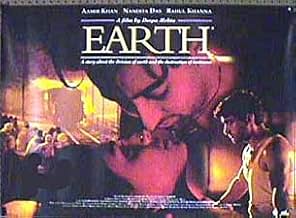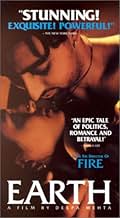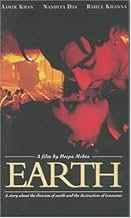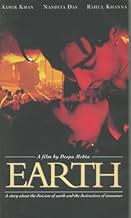It's 1947 and the borderlines between India and Pakistan are being drawn. A young girl witnesses tragedy as her ayah (nanny) is caught between the love of two men and the rising tide of poli... Read allIt's 1947 and the borderlines between India and Pakistan are being drawn. A young girl witnesses tragedy as her ayah (nanny) is caught between the love of two men and the rising tide of political and religious violence.It's 1947 and the borderlines between India and Pakistan are being drawn. A young girl witnesses tragedy as her ayah (nanny) is caught between the love of two men and the rising tide of political and religious violence.
- Awards
- 3 wins & 2 nominations total
- Hariya
- (as Raghuvir Yadav)
- …
- Butcher
- (as Pavan Malhotra)
- Director
- Writers
- All cast & crew
- Production, box office & more at IMDbPro
Featured reviews
For me this movie is not about partition,but about human nature.The veil that separates us from animals becomes an anomaly in certain situation.So it is not so much the partition that drew the worst out of the characters but the demons such as lust,violence,jealousy,anger,resentment that already exist at the very core of human nature.It may or may not manifest itself in its most carnal form.But in this case it does.
The innovation of songs as a part of narration was a masterstroke and when you have A R Rehamn at the fore,there will be magic."Raat Ki Dal Dal" is probably one of the most wonderfully pictured songs I have have seen in recent times,as the camera zooms in on Aamir as he is waiting for the train from India,encapsulating his anxiety.The art work is accurate enough,the cinematography is excellent(notice how the camera-work changes from being still and peaceful in first half to more vibrant in the second half).
The performances of the entire cast is brilliant,whether it is the parsi family or Dil Nawaz's friend circle or even Gulshan Grover for that matter.Everyone seems to be on the money.Rahul khanna is a natural talent like his brother(which explains why he is not making it big in this superficial industry),he is rightly understated through the film.His is the only character which doesn't have as many demons and is probably at peace with himself after having the women of his dreams.Nandita Das is a brilliant actress whom I have long admired along with Seema Biswas and Konkana Sen.Her courage and talent shines through as she plays a character who is oozing sexuality,is flirtatious and maybe some what naive.
In case of great actors,I try not to use the "best" and "greatest" to describe their performances,because it in a way diminishes their remaining equally brilliant body of work.But this was a new high for Aamir khan in my book.Before this movie I thought he was one of the most talented,versatile and courageous actors within the industry.This film is where he transcended to greatness and stayed there.To be very honest,most of the ground work was laid in the novel for this role,but one needs great vision to convey this charming character's journey into madness.The use of body language and "silence" is what separates the great actors from others.Al Pacino,George C Scott,De Niro,Sanjeev Kumar understood the value of it and here Aamir showcases his class especially in the climax.
This film is not for the faint hearted.But that is what I have admired Deepa Mehta for.She has always been ruthlessly truthful when it comes to human nature whether it is "earth" or "fire".Unfortunately most of the Indians like the "escapist" mode just to "make them feel good about themselves".If you are one of those this not for you.
P.S.Majority of the reviews here are spot on and people not aware of the horrors of partition were also able to connect on a human level which fulfills the purpose of this film.
As Parsees, India's "invisible" people, Lenny's wealthy family is supposedly sheltered from the growing conflict by an ever-fragile 'neutrality'. Lenny's naïvety is used quite effectively to endear her to the viewer. Her innocence makes the tragedy of Partition even more profound. The events occurring are incomprehensible to Lenny; her naïvety is best illustrated in the opening scene, in which she breaks a plate and, utterly perplexed, enquires "Can one break a country?" The story, though narrated by Lenny at beginning and end, does not always seem to be from her viewpoint and one doubts if she could accurately be described as the protagonist.
Lenny's Hindu ayah, or nanny, appears to be more of a focus. Shanta (Nandita Das) is beautiful, and is surrounded by a circle of male admirers, and, in particular, two Muslims suitors who vie for her affection. One is the poetic Dil Navaz (Aamir Khan), or as Lenny calls him, Ice Candy Man, and the other is a masseuse, Hassan (Rahul Khanna). Although it initially seems that it is with Dil Navaz that her affections lie, Hassan proves to be her true love, much to the surprise of the viewer. Whilst it is never really shown why Dil Navaz's courtship fails, the viewer could infer that it he lacked a certain gentlemanliness and that he possessed a certain darkness. What is clear is the love that Hassan has for Shanta; a love that is realised in a beautifully handled love-scene. Shanta is a woman for which he would convert to Hinduism and risk his life.
Mehta does not shy away from depicting the savagery of the conflict and the film possesses some extremely powerful moments. One in particular is the debilitating and horrifically gruesome 'de-limbing' of a man caught in the fury of a mob. Another, arguably most powerful, scene is the discovery of a trainload of massacre victims by Dil Navaz, among them his sisters, and sacks of severed breasts. The climax of the movie is a devastating illustration of the consequences of unrequited love. In the scene, we see the supposed protection of the Parsees crumble as an enraged Muslim mob arrives seeking Hindus and Sikhs. Shanta, a Hindu, is hidden in the house, as the mob questions workers who have converted from Hindu and Sikh to Muslim and Christian and then demands Shanta. Dil Navaz, played deftly by Aamir Khan, appears from the crowd, and appearing a "hero", deceives Lenny into revealing Shanta's whereabouts who is then dragged away screaming, and presumably murdered.
Based on the novel "Cracking India", by Bapsi Sidhwa (who co-adapted the script), the film translate to screen in a rich, flowing melodrama. It is strong in symbolism and the obvious motif of 'breaking' (plates, persons, dolls and relationships) works to keep the Partition in frame-of-mind. Mehta has created a sensual piece of dazzling colours that correspond with the moment in time in the first half it is joyful and organic, in the second it is dark and ominous. The accompanying soundtrack, by A.R. Rahman, is effective and appropriate. However, the film sits awkwardly betwixt the style of 'Bollywood' and that of Hollywood. It has, one could argue, obviously been made with a Western audience in mind, and consequently, does not set to be historically informative. Nevertheless, it is an effective piece that does not befuddle the viewer, and provides insight into how people were directly affected by the Partition, an event that still reverberates today.
(S. R. Watson, Flinders University, Adelaide)
If the film is conventional is outline, it is also intelligent, beautiful and economical in a way most stodgy historical epics are not. Its predominantly Western structure is filtered through with a restrained Bollywood sensuality, and, in the first half especially, after one has gotten used to the rather stilted dialogue and stylised situations, one is astounded by the caressing fluidity of the camerawork; the uncommon beauty of compositions, especially indoors, where the essentially muted 'earth' colours of the decor are pierced by unearthly shards of light; the profusion of dazzling colours, in costumes, and especially in the horrific marriage sequence, undermining the strained sobriety of most historical epics; the unforced breaks into song and dance, the accumulation of vignettes, some comic, some full of joy and promise, some bursting with foreboding, that give a sense of life being lived, a life already fragile in status, waiting to be destroyed; the unabashed use of melodrama, its critical framing device (in one horrible scene, the protagonists watch helplessly from a balcony the strangely beautiful conflict, passive like us the audience), and its emotional demands on the audience I realise that much of my pleasure comes from a racist 'Orientalism', a projection of my desires of exoticism and Otherness on the East, but my own country has a traumatic history of British Imperialism and partitions, so I don't feel too guilty.
The first half is as good as anything in cinema this year, once one has got used to the shifts in register. It is full of the autumnal sadness of a Chekhov play, or Ray's CHARULATA, or LE REGLE DU JEU, where we observe people living life, being friends, making love playing games, while we know history is sadistically poised on the brink, waiting to crush everything. Mehta never falls into nostalgia for this doomed idyll - she records the legacy of the British Empire; the horrors of the caste system; the emotional repression, the arranged marriages between senile paedophiles and pre-pubescent girls. But this section is also full of epiphany, the thrill of the sexual chase, friendship, poetry and, above all, comedy, all the things about to be distorted and destroyed by history as it performs a body snatching operation onto people we have come to love and turns them into vicious murderers.
The second half is an unrelenting catalogue of jolting spasms of violence. Day gives way to night, earthy browns and sun to blackness, friendship and love to death and hate. The film is also a bildungsroman, the tale of the development of a young girl as she learns about life, love, family, gender, language, society, history, culture, politics a development cruelly cut short, distorted, vandalised - when we see the charming dew-eyed narrator half a century later, emotionally in ruins as she stands self-effacingly in the ruins of Imperial pomp (an amazing shot, the film's sparing use of ruined architecture gives the film on occasion a ghostly feel), we sense irreperable loss.
Most of the comments here on IMDb are positive and I agree with these reviews. However, for me the cynicism of the critics was unfounded because I was not expecting the usual Hollywood movie. If you cannot relate to this film in a positive way then I suppose that you have not traveled much and have not lived in other cultures, at least not in Asia. This is not an American film made for an American audience.
This is very much an adult film for a sensitive and mature audience. It is certainly not for those seeking the usual thrills and spills and formula love stories. We are given a look at a very important and prominent country being split up by a colonial power, and how this political decision affects millions of people in some of the most awful manners. A million lost their lives! The tension between India and Pakistan still haunts us all ! So don't expect a nice and sweet film, although there were some beautiful scenes of childhood innocence and the romance of young lovers.
The symbolism is rich. At the start we see a dinner table with the main groups of people represented in the formation of Pakistan: English, Sikh, Muslim, Hindu, Parsee. Throughout the film Lenny Baby represents the innocence and naivety which so many people remain in during geopolitical processes. When it is this young girl's birthday, she can find no one who cares. Her birthday is the same day of the Pakistan-India split, and the symbolism is obvious. She then finds a Muslim refugee boy whose mother was brutally killed by Hindus. He asks her if she is a Hindu and when she replies "no" she also asks if he wants some cake. "Cake? What is cake?" Lenny-the-Naive is baffled, and again the symbolism is obvious. So many of us cannot really relate to the plight of refugees. What happens to this innocent and naive position at the end? We are stunned to see the results. Naivety leads Beauty and Love to a terrible fate. Innocence is tragically deceived. It wasn't until my second viewing of this film that I saw the many symbolic references. Watch the film with this perspective and you will see through the cynicism such as writer "Pass the pappadom" makes elsewhere on this page.
One symbolic reference that I am not sure if I understand was that of the Sikh man and his family, hiding from the Muslim killer mob. He was such a sincere and gentle man, and even his dagger raised in defense did not detract from his positive qualities. Was he portrayed in this way because the Sikhs had too much 'bad press' about their warrior ways? Were the Sikhs ineffective in protecting themselves during the division?
A friend of mine told me that he cried all the way home after seeing this film. He is 46 years old and not a weak and overly sensitive person. My wife and I were quite emotionally moved by this film, and we cannot relate to the film critics that say otherwise. By the way, my wife lived in India for a year and she loved seeing the various scenes of everyday Indian life, so you may enjoy the film just for the sake of seeing people living life outside of Hollywood America.
One last symbolic reference to ponder was the touching romantic scene between the two lovers amidst the ancient ruins. Here we see a Muslim man saying that he would convert to Hinduism so that the marriage would be possible. All they needed to do is to leave to live in the newly divided India. The ancient ruins indicate the past, but unfortunately the lovers return to the present.
This is a film that I will remember for a long time. I highly recommend that you see it, if you don't mind a serious film about major issues, seen from a non-American perspective.
Director - writer Deepa Mehta deserves much credit for depicting the complexities of one of the world's worst tragedies with diplomatic balance, not placing blame on any one group but yet revealing the errors and brutality that each group made.
The film, based on the autobiographical novel "Cracking India" by Bapsi Sidhwa, concentrates on the effect the civil turmoil has on personal relationships. Somehow, politics brings out the worst in everyone; submerged resentments and trivial jealousies fuel shocking atrocities. Even innocent little Lenny manages to act badly, despite her "neutral" status.
Despite the presence of at least one "Bollywood" star (Aamir Khan) the director, Deepa Mehta, has not made a crowd-pleaser here. There are survivors, but no surviving heroes. The story unfolds first at a leisurely pace, gaining speed as independence day approaches and ends in a montage of mobs, destruction and violence. Every scene is beautifully composed and almost every part sensitively played. Maia Sethna as Lenny, Nandita Das as her beautiful young nanny Shasta , Rahul Khanna as Hasan, Shastas' lover and Aamir Khan as Dil Navaz the 'ice candy man" are all stand-outs. While not actually filmed in Lahore (the authorities there were not keen, it seems) the film evokes superbly a hot, ancient and troubled land. The whole style of the film is quite different from anything to emerge out of Hollywood and that alone makes it worth seeing.
It is suggested in the film that perhaps the villain here was that old standby, human nature. It does seem, though, that the British India administration (represented here only by one drunken official at a dinner party) and particularly the British government, had a lot to answer for. The twenty-five years or so leading up to independence were marked by the failure of successive conservative British governments to allow a truly responsible democracy to emerge in India when it was quite clear by the end of World War One that independence was inevitable. (The white Dominions on the other hand were practically pushed into independence.) Then, when the post-war Labour government decided to grant independence it did so with unseemly and disastrous haste. No, the chief villain was perfidious Albion, or rather British "muddling through". Here we get a beautiful, moving, elegiac account of the victims of bad colonial policy driven by racism and unenlightened self-interest.
Did you know
- TriviaAamir Khan's first negative role. He went on to receive much critical acclaim for his performance.
- Quotes
Older Lenny: I was eight years old, living in Lahore in March of 1947, when the British Empire in lndia started to collapse. Along with talks of lndia's independence from Britain came rumblings about its division into two countries, Pakistan and lndia. Hindus, Muslims, and Sikhs who had lived together as one entity for centuries. suddenly started to clamor for pieces of lndia for themselves. The arbitrary line of division the British would draw to carve up lndia in August of 1947 would scar the Subcontinent forever.
- ConnectionsFeatured in Women Make Film: A New Road Movie Through Cinema (2018)
- How long is Earth?Powered by Alexa
Details
Box office
- Gross US & Canada
- $424,798
- Opening weekend US & Canada
- $42,449
- Sep 12, 1999
- Gross worldwide
- $424,798
Contribute to this page



































